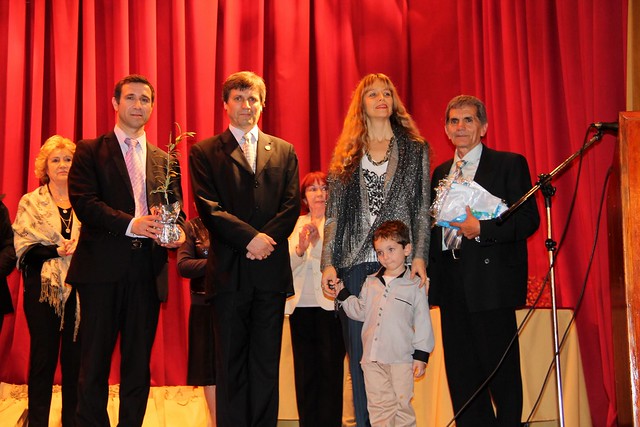Buenos Aires, Argentina—UPF organized an artistic, cultural and interreligious event in celebration of the UN International Day of Peace, whose theme for this year is “Partnerships for Peace-Dignity for All.” It was held on September 21 at Club Español in Buenos Aires, where awards for the seventh annual International Poetry Contest, “Peace in Our Hearts and Light for the World,” were given, which had 391 participants from 34 countries. (For details of the winners, click here.)
Among the attendees were winners and participants of the contest—including Ana María Elizondo Gasperín, who came with her family from Mexico, and Yhudy Genoveva Muñoz Cedeño, a teacher from Ecuador—and representatives of civil society organizations.
The celebration was sponsored by the United Nations Information Centre for Argentina and Uruguay and the Ministry of Culture of the City of Buenos Aires, as well as supported by more than 20 governmental bodies, nonprofit organizations, universities, and media1.
Light from the Soul
The celebration began with a reading of UN Secretary-General Ban Ki-moon’s message for the Day, by Ambassador for Peace, Horacio Daboul, director of El Faro del Sur. This year’s Day comes at a time when the UN is celebrating its 70th anniversary and is adopting the 2030 agenda, a 15-year plan to achieve sustainable development, which is “fundamental to ushering in a life of dignity for all, where poverty is history and peace is paramount,” Ban Ki-moon said in his message.
Ariel Rozen and Diana Toblib, director and member of the Pardés Foundation Choir (of the Jewish community) then inaugurated the interreligious program. They highlighted the importance of cooperation for peace by reading Psalms 133: “How good and pleasant it is when brothers live together in unity!”; “Spread over us your canopy of peace” and “Peace will be over us.”
Afterwards, representatives of different faith communities offered songs. Senpo Oshiro, director of the Soto Zen Buddhist Association of Argentina Nanzenji, recited a sutra for peace, using Buddhist instruments. The New Apostolic Church choir, which was directed by Delia Del Valle Veliz, sang “Juntos aquí.” The Encounter of Communion and Liberation Choir (of the Catholic community), directed by María Cecilia Tejerina, sang “Reina de la paz,”a song composed after the 2004 Madrid train bombings that is dedicated to Holy Mary. The program concluded with the Institute of Religion Buenos Aires choir, directed by Marcelo Rodríguez, of The Church of Jesus Christ of Latter-day Saints, singing, “Jehovah is with you.”
Mr. Carlos Varga, director of the Family Federation for World Peace and Unification in Argentina also sang a song, “Luz del alma.”
The contest was declared to be of cultural and social interest by the city of Buenos Aires. Many writers participated from countries such as Ecuador, Cameroon, Germany, Greece, Italy, Israel, Nigeria, Switzerland and the United States.The nations with the most entries after Argentina were Spain (38 participants), Mexico (21), Cuba (19), Peru (14), Chile (13), Colombia (13), Uruguay (11), Venezuela (8), Brazil (7), El Salvador (4), and Romania (4). This edition of the contest also featured, for the first time, a participant from the "peace white" continent, Antarctica—Rubén Darío Vázquez, who lives in Marambio Base, a research base operated by Argentina. His poem “Antarctic Cry” was selected to be included in the anthology of winning poems. Also selected was “Desilusión,” from Kurdish poet Hussein Habasch, who was forced to emigrate from his homeland of Syria and now lives in Bonn, Germany. The migrant crisis was addressed poetically by writer and poet, Nélida Pessagno, vice president of the Argentine Society of Writers (SADE), during her speech on behalf of the contest’s patrons.
Change Your Heart
There were two especially moving moments. The first was listening to Mr. Vázquez read his poem, which was received with applause. Dr. Juan Carlos Luján, president of the Marambio Foundation, helped set-up the necessary equipment for Mr. Vázquez to communicate through the Internet from Antarctica. The second was UPF’s donation of an olive tree sprout that dates back to Jesuit missions in Paraná, the capital city of Entre Ríos province, to Sandra Villalba, director of the Inclusion Workshop Messengers of Francis, who wants to connect immigrants with the values and legacy of the Jesuit tradition. The olive tree, a symbol of peace and hope, was given to Mrs. Villalba by Eduardo Borri and Jackeline Giusti, coordinators of the Pacis Nuntii Movement and promoters of the Universal Peace Flag. Olive tree sprouts were also given to the international winners and participants.
The event concluded with Germán Barceló singing two songs from his newest album, “Suelto las riendas,”as well as performing "Buscaré Señor tu voluntad" The audience cheered, clapped their hands and then sang along with Mr. Barceló.
The participants enjoyed one another’s company afterwards and could take with them the collection of winning and selected poems of the contest, which also included the jury’s decision for giving the shared first prize. The winners received a copy of “As a Peace-loving Global Citizen,” the autobiography of UPF founder, Rev. Sun Myung Moon.
1 Supporters: John F. Kennedy Argentina University; Merchant Marine University; Religious Studies College; Department of Culture, José C. Paz Municipality; Argentinian Board of Women Organization; Peace Council of Argentina; International Educational Foundation; Pacis Nunti Movement; Brother City Association of San Clemente Argentina-San Clemente California; Cultural and Social Arab League Association; Argentinian School of Yoga and Ayurveda; World Federation of Women “Great Teachers”–Argentina; FOCOS Foundation of Social Commitment for the Action; Marambio Foundation; Interreligious Network Together for the Community; Rotary Club of Parque de los Patricios; Neighborhood and Historical Studies League of Villa Crespo; Chamber of Commerce, Industry, Tourism, and Services of Parque de los Patricios; Generación Abierta; El Faro del Sur; “Todo Aroma” radio program; Human Neurocapital; FFWPU.

